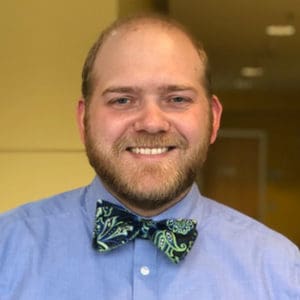
New Aerospace Engineering faculty member focuses on engineering education research
Assistant Professor Aaron Johnson studies how students learn and ways faculty instruction can support students’ career launch.

Assistant Professor Aaron Johnson studies how students learn and ways faculty instruction can support students’ career launch.
Aerospace engineering alumnus Aaron Johnson (BSE 2008) is home again on the University of Michigan campus, and he couldn’t be more delighted. Johnson is the newest Aerospace Engineering faculty member, starting in August 2021 as an assistant professor and a core faculty member of the Engineering Education Research program.
“It’s great to be back,” said Johnson, who experienced some life-changing events at U-M during his previous three stints on campus as an undergraduate, admissions intern, and post-doctoral research fellow and instructor. “I met my wife in the lobby of FXB [as an undergraduate] and my research interest really came out of my teaching AERO 215 [Introduction to Solid Mechanics and Aerospace Structures] as a post doc.”

Johnson earned his PhD in Aeronautics and Astronautics from MIT, exploring how operators respond to the dynamic re-allocation of tasks during flight. As a U-M faculty member, he is focusing on how students engage in the productive beginnings of professional engineering practice and how instructors’ pedagogy and assignments can best support those productive beginnings.
A big part of his research is to use qualitative methods to understand how students think about things like open-ended problems and macroethics. With that understanding in hand, he then developments practical ways to improve the engineering curriculum and instruction.
According to Johnson, engineering instruction typically involves giving students constrained problems, where they learn to apply the right math formula to get the right answer. This type of practice problem solving is important, but it’s not how engineering professionals use math, said Johnson.
“In practice, engineers are not given a well-defined problem in real life,” explained Johnson, who developed open-ended modeling problems such as modeling the Nomad airplane in the lobby of FXB when he was teaching Aero 215. “Students had to create the problem almost and make a lot of assumptions, so these open-ended modeling problems complement the traditional textbook problems we do in class.”
After rigorously researching student’s responses to this type of instruction, Johnson said faculty at five other universities now implement this approach to teaching.
An empathetic and enthusiastic instructor, Johnson has received recognition for his teaching, including two Silver Shaft Awards for Undergraduate Teaching from the Sigma Gamma Tau Aerospace Honor Society when he was a U-M post-doc and a 2021 Sullivan-Carlson Innovation in Education Award from the Engineering Excellence Fund at the University of Colorado Boulder, where he taught from 2019 until 2021.

In spring 2022, Johnson will teach a foundational engineering education course (EER 601) for graduate students enrolled in the Engineering Education Research doctoral program. Next fall, he’ll be back in the Aerospace Engineering Department teaching undergraduates.
Fun facts about Aaron Johnson